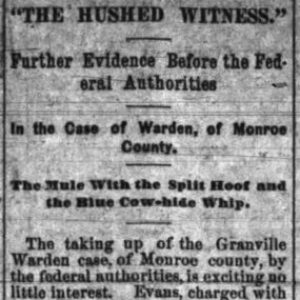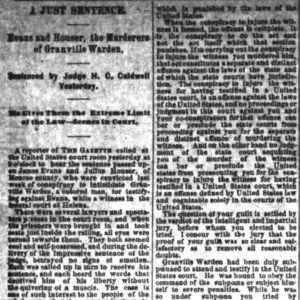calsfoundation@cals.org
Granville Warden (Murder of)
The 1883 murder of an African American man named Granville Warden at Duncan Station (Monroe County) appears as a lynching on the Equal Justice Initiative’s website and several other lynching inventories. The murder itself may not actually qualify as a lynching, however, depending upon the definition employed. Two men were eventually convicted of being directly involved, and then only on charges of intimidating a witness. But the case itself is notable since it brought up crucial questions of state and federal jurisdiction.
In 1880, twenty-six-year-old farm laborer Granville Warden was living in Pine Ridge Township in Monroe County with his wife, Fanny, whom he had married in June 1879. Also in the household were three young children: Salena, Louisa, and Prascar. According to newspaper reports, Warden testified in Circuit Court against a white man named James Evans, who was accused of selling liquor without a license and intimidating witnesses. Evans was acquitted of the first charge and found guilty of the second, but his sentence was suspended on the condition of good behavior. Both Evans and Warden returned to their homes.
On June 17, 1883, the Arkansas Gazette reported that, at about 10:00 p.m. on Thursday, June 14, a mounted white man had appeared at Warden’s cabin asking to be taken to a Squire Gounon’s house. Warden went with him, and when he had not returned by the following morning, his wife went in search of him. Near the cabin, she found the place where “four or five horsemen had congregated” and followed the tracks for two miles, eventually finding Warden’s body. He had been hanged and then placed in a shallow grave concealed with brush near Palmer’s Station (Monroe County). According to the Gazette, Warden and several other African Americans had testified against Evans in circuit court the previous fall. A coroner’s inquest was held in Warden’s death, but the results had not yet been determined. Two days later, the Tennessean published a slightly different version of the story, reporting that Warden had been hanged on July 15 at Duncan Station. The reporter opined that Evans would be “vigorously” prosecuted.
On June 22, the Arkansas Gazette reported that James Evans had been arrested for Warden’s “lynching” and had appeared in an “examining” trial in Clarendon (Monroe County). The magistrate declined to grant bail, and Evans was jailed to await his appearance before a grand jury. On July 3, the Gazette reprinted an editorial from the Memphis Appeal opining that the arrest of Evans in Arkansas, “whose people are stigmatized by the Pharisees of other states as semi-civilized,” had set an example “to those who are constantly prating about their obedience to the law and congratulating themselves that they are more righteous than their neighbors. All praise to the people of Arkansas for the brave stand they have taken against mob law.”
On July 14, the Arkansas Gazette gave a detailed and somewhat different description of the incident. Based on the testimony of Fanny Warden at a trial in Helena (Phillips County), one night, after the Wardens had put their children to bed and retired, a man on horseback appeared outside their cabin and called out to them. According to Fanny Warden, her husband answered through a crack in the wall, and the man called back that he was looking for “Alf. Gallon’s,” where someone was sick. Warden gave him directions, but the man replied that he would pay him if he showed him the way. After Warden went out to see the man, Fanny heard him yell the word, “murder,” and then exclaim, “Oh! Lord.” She went to the neighbors and asked for help. Granville Warden’s body was found the next day; he had been hanged from a tree and then his body cut down and concealed in the branches of a fallen tree. The Gazette referred to Warden’s death as a “cowardly, dastardly murder” and called it “one of those bloody crimes so difficult for civilized people to believe.” The Gazette also noted that the “secret service” had arrested three other people who may have been accessories to the crime: Alex Burke (later referred to as Baker), Alonzo Hauser (later referred to as Lorenzo Houser), and Richard Gideon. Gideon and Burke lived with the Hausers, and they were often seen with Evans. Twenty people, mostly African American, had testified, and Major J. C. Palmer and his son, near whose home the crime had occurred, were subpoenaed. On July 15, the Gazette noted that the federal authorities were not interfering in the murder case but that they had arrested Alex Burke, Richard Gideon, and Lorenzo Hauser for intimidating a witness appearing before a federal court. The Gazette opined that “the wonder is that these parties were not arrested by the Monroe county authorities for complicity with Evans.” Burke, Gideon, and Hauser were confined in the penitentiary for safekeeping. Evans was acquitted of murder but was kept in jail pending his trial for witness tampering in federal court.
The pending trial soon caused a legal controversy over federal and state jurisdiction. According to federal law (Revised Statutes, Section 5508): “If two or more persons conspire to injure or oppress, threaten or intimidate, any citizen in the free exercise or enjoyment of any right or privilege secured to him by the constitution or laws of the United States, or because of his having so exercised the same; or if two or more persons go in disguise on the highway, or on the premises of another, with intent to prevent or hinder his free exercise or enjoyment of any right or privilege so secured, they shall be fined not more than five thousand dollars and imprisoned not more than ten years.” The next section, 5509, holds: “If in the act of violating any provision in either of the two preceding sections, any other felony or misdemeanor be committed, the offender shall be punished for the same with such punishment as is attached to such felony or misdemeanor by the laws of the state in which the offence is committed.” Thus, if Evans and the others were tried for witness tampering in federal court and convicted, they could then be tried for murder and given the state penalty.
On July 17, 1883, a reporter for the Gazette ventured the opinion that the federal court could try the alleged perpetrators for murder. On July 19, the Gazette reported on an interview with Judge C. C. Waters, who was trying the case. The reporter asked Waters if, in the course of prosecuting the men for intimidating a witness under Section 5508, they discovered that the men murdered Warden, the court would then have jurisdiction to then try them for murder under Section 5509. Waters replied in the affirmative and said that he had the option of imposing the death penalty. According to Waters, “The murder grew out of a case in the federal court, which gives the court jurisdiction under the sections referred to.” The defense attorney (listed as S. P. Hughes, likely future governor Simon Pollard Hughes) accused the Gazette of falsely asserting that the federal court had jurisdiction over a possible murder case, but that “to the state governments alone belongs the right and duty of protecting citizens in the rights of personal liberty.” The Gazette corrected its earlier story, saying that the reporter had not stated an opinion and that the paper did not think that the federal court had jurisdiction.
While the alleged conspirators, now listed as Julius Houser, Richard Gideon, Lorenzo Houser, and Alexander Baker, had been housed in the state penitentiary, Evans had remained in the Clarendon jail. In mid-October, he was brought to Little Rock (Pulaski County) and jailed in the penitentiary to await the action of the U.S. court. By November 21, the trial was underway, the final suspect, Julius Houser, having been arrested the day before. About forty witnesses were sworn in, and the Gazette noted: “It is likely that this case will require some determination.”
In the end, however, the trial did not last very long. On November 25, the Gazette reported that the jury had returned guilty verdicts against James Evans and Julius Houser and acquitted Lorenzo Houser, Alexander Burke, and Richard Gideon. According to the December 4 edition of the Gazette, Evans was given the maximum sentence, six years at hard labor in a Detroit federal prison and a $5,000 fine. Houser was also sentenced to six years, but in lieu of a fine he was asked to pay court costs since he was the head of a large family that was dependent on him. During sentencing, Judge Caldwell stated that Evans “belonged to that class of men…whose prejudice and ignorance lead them to act on the assumption that it is neither morally nor legally wrong for a white man to inflict personal violence on a negro or deprive him off his natural or legal rights, even to the point of taking his life.” Apparently, the question of whether the state or federal government had jurisdiction had been settled, as Caldwell went on to say: “This court has no jurisdiction of the murder. But the conspiracy to injure the witness…was an offense against the United States.” On December 5, a U.S. marshal departed to take Evans and Houser to the Detroit House of Corrections to serve their sentences.
For additional information:
“Committed.” Arkansas Gazette, June 22, 1883, p. 1.
“Criminal News.” Arkansas Gazette, November 25, 1883, p. 5.
“The Evans Trial.” Arkansas Gazette, November 23, 1883, p. 5.
“Federal Authority.” Arkansas Gazette, July 19, 1883, p. 5.
“Federal vs. State Authority.” Arkansas Gazette, July 20, 1883, p. 4.
“Foul Play.” Arkansas Gazette, June 17, 1883, p. 1.
“The Hushed Witness.” Arkansas Gazette, July 14, 1883, p. 5
“The Hushed Witness.” Arkansas Gazette, July 15, 1883, p. 5.
“A Just Sentence.” Arkansas Gazette, December 4, 1883, p. 6.
“Local Paragraphs.” Arkansas Gazette, October 15, 1883, p. 8.
“The Mob and the Law.” Arkansas Gazette, July 3, 1883, p. 4.
“The Murdered Witness.” Arkansas Gazette, July 17, 1883, p. 5.
“The Murdered Witness.” Arkansas Gazette, July 19, 1883, p. 5.
“Romance of a Life.” Arkansas Gazette, December 4, 1883, p. 4.
“Why Granville Warden was Hung by a Mob.” The Tennessean (Nashville), June 19, 1883, p. 1.
Nancy Snell Griffith
Davidson, North Carolina
 Law
Law Post-Reconstruction through the Gilded Age, 1875 through 1900
Post-Reconstruction through the Gilded Age, 1875 through 1900 Granville Warden Murder Story
Granville Warden Murder Story  Warden Murderers Sentenced
Warden Murderers Sentenced 




Comments
No comments on this entry yet.